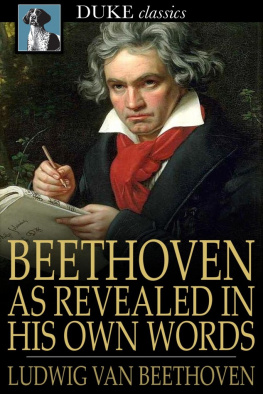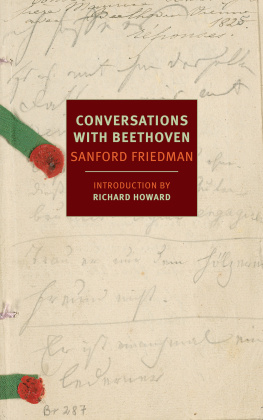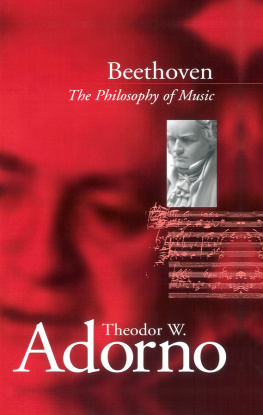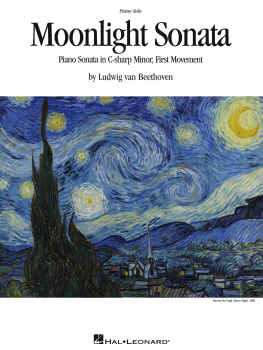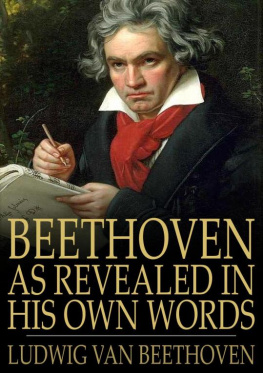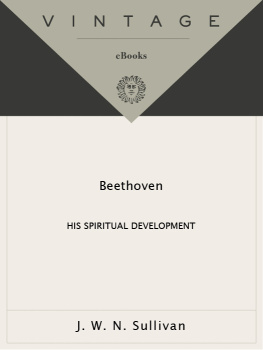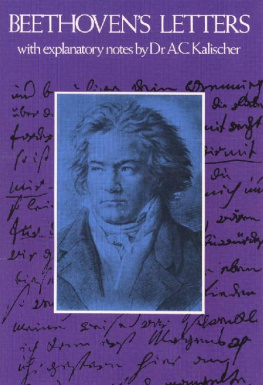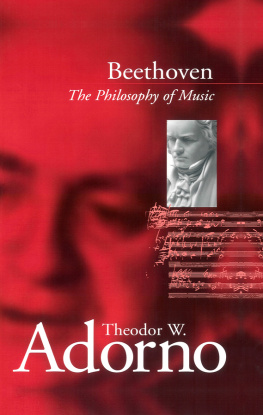Beethoven Ludwig van - Beethoven, as revealed in his own words: the man and the artist
Here you can read online Beethoven Ludwig van - Beethoven, as revealed in his own words: the man and the artist full text of the book (entire story) in english for free. Download pdf and epub, get meaning, cover and reviews about this ebook. City: Germany, year: 2012, publisher: Duke Classics, genre: Detective and thriller. Description of the work, (preface) as well as reviews are available. Best literature library LitArk.com created for fans of good reading and offers a wide selection of genres:
Romance novel
Science fiction
Adventure
Detective
Science
History
Home and family
Prose
Art
Politics
Computer
Non-fiction
Religion
Business
Children
Humor
Choose a favorite category and find really read worthwhile books. Enjoy immersion in the world of imagination, feel the emotions of the characters or learn something new for yourself, make an fascinating discovery.
- Book:Beethoven, as revealed in his own words: the man and the artist
- Author:
- Publisher:Duke Classics
- Genre:
- Year:2012
- City:Germany
- Rating:5 / 5
- Favourites:Add to favourites
- Your mark:
- 100
- 1
- 2
- 3
- 4
- 5
Beethoven, as revealed in his own words: the man and the artist: summary, description and annotation
We offer to read an annotation, description, summary or preface (depends on what the author of the book "Beethoven, as revealed in his own words: the man and the artist" wrote himself). If you haven't found the necessary information about the book — write in the comments, we will try to find it.
Beethoven Ludwig van: author's other books
Who wrote Beethoven, as revealed in his own words: the man and the artist? Find out the surname, the name of the author of the book and a list of all author's works by series.
Beethoven, as revealed in his own words: the man and the artist — read online for free the complete book (whole text) full work
Below is the text of the book, divided by pages. System saving the place of the last page read, allows you to conveniently read the book "Beethoven, as revealed in his own words: the man and the artist" online for free, without having to search again every time where you left off. Put a bookmark, and you can go to the page where you finished reading at any time.
Font size:
Interval:
Bookmark:

The Man and the Artist
From a 1904 edition
ISBN 978-1-62011-499-5
Duke Classics
2012 Duke Classics and its licensors. All rights reserved.
While every effort has been used to ensure the accuracy and reliability of the information contained in this edition, Duke Classics does not assume liability or responsibility for any errors or omissions in this book. Duke Classics does not accept responsibility for loss suffered as a result of reliance upon the accuracy or currency of information contained in this book.
Ludwig van Beethoven (1770-1827) is widely considered to be oneof the pre-eminent classical music figures of the Western world.This German musical genius created numerous works that are firmlyentrenched in the repertoire. Except for a weakness in composingvocal and operatic music (to which he himself admitted,notwithstanding a few vocal works like the opera "Fidelio" and thesong "Adelaide,"), Beethoven had complete mastery of the artform.He left his stamp in 9 symphonies, 5 piano concertos, 10 violinsonatas, 32 piano sonatas, numerous string quartets and dozens ofother key works. Many of his works are ingeniously imaginativeand innovative, such as his 3rd symphony (the "Eroica"), his 9thViolin Sonata (the "Kreutzer"), his "Waldstein" piano sonata, his4th and 5th piano concertos, or his "Grosse Fugue" for stringquartet. (Of course, each of Beethoven's works adds its own uniquedetail to Beethoven's grand musical paradigm.)
It is difficult to sum up briefly what his musical works representor symbolize, since taken together they encompass a vast system ofthought. Generally, however, those who apprehend his music sensethat it reflects their own personal yearnings and sufferings. Itegoistically, and always intelligently, "discusses" with itslistener his or her feelings in the wake of personal failure andpersonal triumph, from the lowest depths of despair to the highestheights of happy or triumphant fulfillment. In his music, herepresents the feelings felt by those attempting to achieve theirgoals within their societies, whether they are competing for love,status, money, power, mates and/or any other things individualsfeel naturally inclined to attempt to acquire.
In a thematic sense, Beethoven does not promote anarchist ideas.The listener cannot, in listening to Beethoven's music, apprehendideas which, if applied, would compromise the welfare of hissociety. The music is thus "civically responsible," as is themusic of Bach or Mozart. For Beethoven, the society exists as abulwark with which the individual must function in harmony, or atleast not function such as to harm or destroy it. And, should thesociety marginalize or hurt the individual, as it often does, theindividual must, according to Beethoven, humbly accept this, neverconsidering the alternative act of attempting to harm or destroythe society in the wake of his or her personal frustrations. But,thanks to Beethoven, such an individual is provided with the meansto sooth his or her misery in the wake of feeling "hurt" at thehands of society. The means is this music and the euphoricpleasure that it can provide to minds possessing the psycho-intellectual "wiring" needed to apprehend it.
Some post-World-War-II composers, such as the late, LSD-using JohnCage, reject the music of Beethoven because of its predominantreliance on "beauty" as way of communicating idealized concepts.Also, since the music intimately reflects the cravings and thought-processes of the natural human mind, which in numerous ways isemotionally and intellectually irrational, the music may itself beconsequently irrational.
The following book consists of brief biographical commentariesabout Beethoven, each followed by sections of quotationsattributed to the muse. In these quotes, Beethoven demonstrateshis intense preoccupation (or obsession) with thinkingartistically and intelligently, and with helping to alleviateman's suffering by providing man with musical artworks that couldenlighten him, so as to become educated enough to pull himself outof his misery. He felt immediate, strong disdain at any artisticstatement that was not truly intelligent and artistic, such as, inhis view, the music of Rossini. Although not prudish, he had highstandards when it came to marriage, and was morally against"reproductory pleasure" for its own sake, or any form of adultery.He never married. Interestingly, experimental psychologists havediscovered that people who have an intense love of humanity orare preoccupied with working to serve humanity tend to havedifficulty forming intimate bonds with people on a personallevel.
This little book came into existence as if it were by chance.The author had devoted himself for a long time to the study ofBeethoven and carefully scrutinized all manner of books,publications, manuscripts, etc., in order to derive the greatestpossible information about the hero. He can say confidently thathe conned every existing publication of value. His notes madeduring his readings grew voluminous, and also his amazement atthe wealth of Beethoven's observations comparatively unknown tohis admirers because hidden away, like concealed violets, inbooks which have been long out of print and for whosereproduction there is no urgent call. These observations are ofthe utmost importance for the understanding of Beethoven, inwhom man and artist are inseparably united. Within the pagesof this little book are included all of them which seemed topossess value, either as expressions of universal truths or asevidence of the character of Beethoven or his compositions.Beethoven is brought more directly before our knowledge by thesehis own words than by the diffuse books which have been writtenabout him. For this reason the compiler has added only thenecessary explanatory notes, and (on the advice of professionalfriends) the remarks introductory to the various subdivisions ofthe book. He dispensed with a biographical introduction; thereare plenty of succinct biographies, which set forth thecircumstances of the master's life easily to be had. Those whowish to penetrate farther into the subject would do well toread the great work by Thayer, the foundation of all Beethovenbiography (in the new revision now making by Deiters), or thecritical biography by Marx, as revised by Behncke. In siftingthe material it was found that it fell naturally into thirteensubdivisions. In arranging the succession of utterances carewas had to group related subjects. By this means unnecessaryinterruptions in the train of thought were avoided andinteresting comparisons made possible. To this end it wasimportant that time, place and circumstances of every wordshould be conscientiously set down.
Concerning the selection of material let it be said that in allcases of doubt the authenticity of every utterance was proved;Beethoven is easily recognizable in the form and contents of hissayings. Attention must be directed to two matters in particular:after considerable reflection the compiler decided to include inthe collection a few quotations which Beethoven copied from bookswhich he read. From the fact that he took the trouble to writethem down, we may assume that they had a fascination for him, andwere greeted with lively emotion as being admirable expressionsof thoughts which had moved him. They are very few, and the factthat they are quotations is plainly indicated. By copying theminto his note-books Beethoven as much as stored them away in thethesaurus of his thoughts, and so they may well have a placehere. A word touching the use of the three famous letters toBettina von Arnim, the peculiarities of which differentiate themfrom the entire mass of Beethoven's correspondence and compel aninquiry into their genuineness: As a correspondent Bettina vonArnim has a poor reputation since the discovery of her prettyforgery, "Goethes Briefwechsel mit einem Kinde" (Goethe'sCorrespondence with a Child). In this alleged "Correspondence"she made use of fragmentary material which was genuine, piecedit out with her own inventions, and even went so far as to turninto letters poems written by Goethe to her and other women. Thegenuineness of a poem by Beethoven to Bettina is indubitable; itwill be found in the chapter entitled "Concerning Texts." Doubtwas thrown on the letters immediately on their appearance in 1839.
Font size:
Interval:
Bookmark:
Similar books «Beethoven, as revealed in his own words: the man and the artist»
Look at similar books to Beethoven, as revealed in his own words: the man and the artist. We have selected literature similar in name and meaning in the hope of providing readers with more options to find new, interesting, not yet read works.
Discussion, reviews of the book Beethoven, as revealed in his own words: the man and the artist and just readers' own opinions. Leave your comments, write what you think about the work, its meaning or the main characters. Specify what exactly you liked and what you didn't like, and why you think so.

